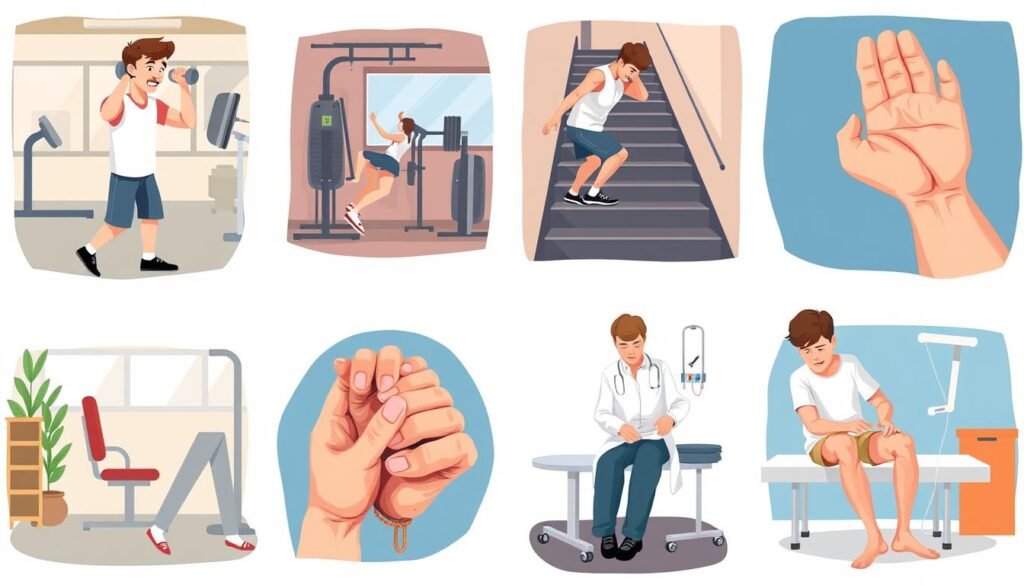Did you know up to 2.5 million Americans battle with chronic fatigue syndrome? This condition often leads to muscle weakness and fatigue. This large number shows how common these issues are. They can greatly impact daily life. Learning about the causes, spotting the signs, and finding good treatments are key.
Muscle weakness and fatigue come from many health problems, lifestyle choices, and getting older. It matters whether you’re healing from an injury, fighting a long-term illness, or just tired from working out. It’s vital to see and fix these issues in a full way. This piece gives deep insights into handling muscle weakness and fatigue, including ways to get better and options for recovery.
Key Takeaways
- Muscle weakness affects millions and can stem from various health conditions.
- Chronic fatigue syndrome is a key contributor to muscle fatigue in many individuals.
- Understanding the signs of muscle fatigue is essential for timely intervention.
- Lifestyle changes can significantly help in managing muscle weakness effectively.
- There are numerous effective treatments available for muscle weakness and fatigue.
- Aging impacts muscle strength and recovery, making regular exercise important.
Understanding Muscle Weakness
Muscle weakness is when muscles can’t exert enough force, making daily tasks hard. It shows up in many ways, from feeling tired to not being able to move muscles at all. It’s important to know there are three main types of muscle weakness.
True muscle weakness means the muscles don’t work right due to health problems. Diseases like autoimmune disorders and chronic conditions cause this kind. People with diabetes, for instance, may see their muscle strength fade, which makes moving around harder.
Muscle tiredness is different. It comes from feeling overall exhaustion, not just in the muscles. It might happen after a long day or intense workout. Up to 30% of people with chronic fatigue syndrome also deal with muscle weakness, showing how tiredness impacts strength.
Muscle fatigability is about muscles getting weak quickly during activities. Different muscles recover and endure in various ways. Those who are less active or have chronic health issues often struggle with ongoing muscle tiredness, leading to more weakness over time.
Many things cause muscle weakness. Not moving enough, especially with aging or sickness, is a big factor. A study from 2023 found critically ill patients in ICU lose muscle mass fast, showing why it’s crucial to act early. Neurological diseases like multiple sclerosis are another big cause, affecting many people.
In short, knowing about muscle weakness helps us find better ways to deal with it. Recognizing different types from true weakness to fatigue from daily life is key. This knowledge is important for improving how we live and move.
Signs of Muscle Weakness and Fatigue
It’s important to know the signs of muscle weakness and fatigue. People often feel very tired, their muscles feel weak, and they might get sore or have cramps. A lot of times, they feel their grip isn’t as strong or have pain after being active. If this weakness or tiredness keeps happening without a clear reason, it’s time to see a doctor.
Older adults might struggle more with muscle weakness because of aging. Conditions like sarcopenia typically start affecting people in their 60s or 70s. Also, some medicines can make muscle weakness worse. Drugs such as corticosteroids and statins are known for this. Even infections like the flu can make your muscles feel weak for up to two weeks. However, you’ll get better as you recover from the illness.
Severe illnesses like COVID-19 can also lead to muscle weakness, especially if you have to stay in bed. Diseases such as multiple sclerosis can cause it too, along with numbness. This affects how well you can move around. Muscle weakness can also happen because of sleep issues, thyroid problems, chronic fatigue syndrome, or even heart disorders.
Seeing a doctor quickly is important if your muscle weakness happens suddenly in one part of your body. This could mean something serious like a stroke or nerve damage. If your muscle tiredness doesn’t go away after two weeks, you should get it checked out. It could be a sign of a deeper health problem, like anemia or a metabolic disorder. Noticing these signs early can help you take care of your health better.
To help with muscle fatigue, adjusting your diet might be useful. You can learn more about this by checking out this resource.
Common Causes of Muscle Fatigue
Muscle fatigue happens for many reasons, including lifestyle and health issues. Doing a lot of exercises can make you feel temporarily tired. This is more noticeable after hard workouts. Additionally, problems like anemia, not drinking enough water, chronic fatigue syndrome, and getting sick can make muscle tiredness worse. Mental health issues such as depression also affect how tired you feel.
As we get older, our muscles naturally get less strong. This leads to more tiredness. Illnesses like heart failure and arthritis add to the problem, making people feel even more tired. Also, some medicines can make you feel tired.
Finding out why you’re feeling tired is important to deal with it properly. Drinking enough water is essential to avoid feeling unnecessarily tired. For a deeper understanding, you should look at detailed resources on muscle fatigue. They can give you better ways to handle this issue. To learn more about muscle fatigue, click here.
Primary Types of Muscle Weakness
It’s vital to know the main kinds of muscle weakness for proper care. These distinctions let doctors adapt their methods to fit each person’s needs. They include true muscle weakness, muscle tiredness, and muscle fatigability.
True Muscle Weakness
True muscle weakness shows a notable struggle in doing everyday muscle tasks. It can come from many disorders. For example, in muscular dystrophies, muscle fibers get weaker over time. It’s also key in spotting Guillain-Barré syndrome, which starts as sudden muscle weakness after an infection.
Muscle Tiredness
Muscle tiredness, or asthenia, is feeling tired despite normal muscle function. Even basic activities seem harder. This fatigue is common in chronic issues like multiple sclerosis and Addison’s disease. Here, the body can’t keep up endurance.
Muscle Fatigability
Muscle fatigability means muscles quickly lose strength during use. This leads to fast exhaustion with effort, and it may occur alongside muscle tiredness. Myasthenia gravis is a clear example. In this condition, problems at the neuromuscular junction affect sustained muscle use.

Muscle Weakness and Fatigue: Impact of Aging
Aging changes our body, especially our muscles’ strength and function. As we get older, we often see muscle weakness. However, studies show people over 65 still fight off muscle fatigue well. They seem to have a special strength even as they age.
Older adults might be as strong as younger ones, showing muscle power doesn’t just fade with age. They can even have better endurance in some cases. But, results vary. Some older adults feel more tired, while others don’t. This shows we need to think about exercise and health overall.
Sarcopenia affects many over 60, making it hard to move and stay independent. After 50, we lose muscle strength by 1% to 2% every year. This makes falling more likely.
With fewer older adults staying active, it’s key to keep moving. About 20% of them work out enough to fight muscle loss. Staying active is very important as we age.
| Age Group | Prevalence of Sarcopenia | Muscle Mass Loss (%) | Mobility Decrease (%) |
|---|---|---|---|
| 60+ | 30% | 25%-50% (30-80 years) | Up to 40% |
| 80+ | 50% | – | – |
Lifestyle Changes for Managing Muscle Weakness
Making lifestyle changes can greatly help with muscle weakness. These changes are personalized, focusing on boosting strength and reducing fatigue.
Importance of Regular Exercise
Regular exercise is key to stronger muscles and better health. Sadly, around 80% of adults in developed countries don’t exercise enough. This inactivity leads to muscle weakness and tiredness. Adding moderate to vigorous workouts can make a big difference. They offer exercise for fatigue relief and boost energy. Even older adults feel more energetic with regular exercise, around 60% see benefits.
Nutrition and Hydration
Eating right is essential for muscle health. The right nutrition provides vitamins and minerals needed for energy and muscle work. About 60% of fatigue cases are due to bad eating habits. Drinking enough water also helps muscles recover and work well. Eating fruits, vegetables, lean meats, and whole grains improves health. For more tips on beating fatigue and muscle weakness, check out this guide.

| Lifestyle Factor | Impact on Muscle Weakness | Recommendations |
|---|---|---|
| Regular Exercise | Enhances strength and stamina | Engage in at least 150 minutes of moderate exercise weekly |
| Nutrition | Provides necessary nutrients for muscle health | Focus on a balanced diet rich in vitamins and minerals |
| Hydration | Supports recovery and muscle function | Drink at least 8 cups of water daily |
| Sufficient Sleep | Restores energy and supports overall health | Aim for 7-9 hours of quality sleep each night |
| Stress Management | Reduces emotional fatigue | Practice relaxation techniques such as yoga or meditation |
Effective Treatments for Muscle Weakness
To address muscle weakness, a personalized plan is key. Treatments can include physical therapy, diet changes, and medical approaches. These help improve strength and control.
Physical Therapy Options
Physical therapy helps rebuild muscle strength and function. It involves exercises that boost muscle endurance. Patients often see progress with personalized exercise plans.
Therapists tailor these plans to focus on certain muscles. This approach enhances mobility and life quality. It’s an effective muscle weakness treatment.
Dietary Adjustments
Good nutrition is crucial for fighting muscle weakness. Eating enough vitamins, minerals, proteins, and omega-3s boosts muscle health. This can speed up recovery and strengthen muscles.
For those with nutrient deficiencies, the right diet is a powerful treatment for muscle weakness. It enhances energy and stamina.
Medical Interventions
Sometimes, doctors need to step in. They may prescribe medicine for long-term or sudden muscle issues. Drugs can also help with hormone problems.
Addressing issues like Addison’s disease or thyroid problems is important. Medicine, along with lifestyle changes, can significantly aid recovery. This forms a critical part of an effective muscle weakness treatment plan.
| Treatment Type | Description | Potential Benefits |
|---|---|---|
| Physical Therapy | Structured exercise programs with a trained therapist | Increased strength and functionality |
| Dietary Changes | Increased intake of essential nutrients and proteins | Improved recovery and muscle health |
| Medical Treatments | Medications targeting hormonal or chronic muscle issues | Correction of underlying conditions and muscle recovery |
Natural Remedies for Muscle Fatigue
Exploring natural remedies can help manage muscle fatigue well. Many people look for ways to boost their energy and reduce muscle weakness. Strategies like herbal supplements and restorative practices can improve recovery and well-being.
Herbal Supplements
Herbal supplements may benefit those with muscle weakness. Ashwagandha and rhodiola are favored for natural fatigue treatments. These herbs can increase stamina and lessen exhaustion.
Research shows tart cherry juice may reduce muscle soreness by 24%. It helps athletes recover faster. Coffee with average caffeine content can also boost performance. It may reduce fatigue levels by up to 30% in moderate users.
Restorative Practices
Adding restorative practices to daily routines can ease muscle fatigue. Yoga, acupuncture, and relaxation exercises help reduce fatigue. They allow muscles to recover more effectively.
About 56% of people with chronic pain find massage therapy helpful. It is a good way to reduce discomfort. Staying hydrated is key, with studies linking it to better muscle function and performance.

| Remedy Type | Examples | Benefits |
|---|---|---|
| Herbal Supplements | Ashwagandha, Rhodiola, Tart Cherry Juice | Boosts stamina, reduces muscle soreness |
| Restorative Practices | Yoga, Acupuncture, Massage | Reduces fatigue, promotes muscle recovery |
| Hydration | Water intake above 2.7 liters | Prevents cramps, supports performance |
Strategies for Combating Fatigue
Finding the right ways to fight fatigue is key to improving our health and happiness. Often, people don’t see how their daily choices affect their energy. By focusing on our sleep and how we handle stress, we can feel less tired.
Sleep Hygiene
It’s important to have a steady bedtime routine to feel less tired. Using good sleep habits helps our bodies recharge more effectively. Here are some top tips for better sleep:
- Going to bed and waking up at the same time every day helps a lot.
- Make your sleep space peaceful. Keep it free of tech and loud noises.
- Stay away from caffeine before bed to keep your sleep patterns steady.
- Keep your bedroom dark and cool for a more comfortable night’s rest.
- Taking short naps (between 10-30 minutes) can boost your energy without messing up your night’s sleep.
Stress Management Techniques
Managing stress well can make you feel calmer and more energized. Here are some proven stress-relief methods:
- Mindfulness and meditation can clear your mind and lower anxiety.
- Trying yoga or tai chi can help lessen feelings of tiredness.
- A quick 15-minute walk every day can instantly lift your energy.
- Using Cognitive Behavioural Therapy (CBT) can tackle stress and anxiety-related fatigue.
- Drinking enough water is crucial as even slight dehydration can make you feel tired.
To better handle our energy and enhance our life, it’s important to know and use these fatigue-fighting tactics.
Conclusion
To tackle muscle weakness and fatigue, it’s vital to know the signs. These signs can be tiredness and less function. Making lifestyle changes like exercising and eating right is key. These steps are crucial for managing fatigue well.
Being active is important for keeping energy up, studies show. For example, young women have more muscle strength at the start than older women. This shows we need fitness plans that fit everyone’s needs.
But it’s not just about being active. It also means looking into treatments and natural remedies that match your needs. A big study showed how muscle weakness works and why good check-ups are needed. Also, knowing how muscle tightness and weakness can happen together helps us find better ways to get stronger.
Having access to good information can help people feel better and live better.
At the end of the day, beating muscle weakness takes work from both patients and doctors. Finding what works for you and sticking to healthy habits is the foundation. By exploring both lifestyle and treatment options, you can really improve your movement and life quality. Resources and info like clinical characteristics of muscle weakness are key to this process.